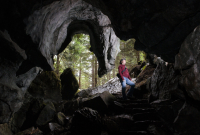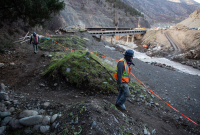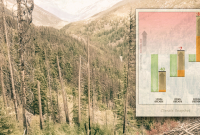Support strong Canadian climate journalism for 2025
Imagine if we had listened to those who were raising the alarm about climate change in 1972. Fifty years ago, scientists knew about the link between burning fossil fuels, releasing carbon dioxide into the atmosphere, and rising temperatures on the planet. World leaders had this information then but failed to act.
The science is even clearer now — with evidence of a changing climate all around us. As I write, wildfire smoke is choking the sky, and the Sunshine Coast was declaring a local state of emergency due to drought and concerns about water shortages. Rivers and creeks across B.C. are at record-low levels; salmon are dying in the tens of thousands, unable to make it to their spawning grounds in time. Cedars and Douglas firs are suffering; they are not adapted to dry climates like these.
While the B.C. government claims to be a climate leader — touting its CleanBC plan as the strongest climate plan in North America — the evidence tells a different story.
Under the BC NDP’s watch, old-growth trees continue to be logged, and primary forests cut, turned into pellets and burned. A fracked gas pipeline is being drilled under a sacred river in northern B.C. and $25 million in public funds has been spent enforcing a militarized zone around the construction site.
The government continues to subsidize the oil and gas industry. The NDP meets with oil and gas lobbyists up to 80 times a month. Revealing, the BC NDP’s chief electoral officer, Elizabeth Cull, is a senior associate with an oil and gas lobbyist firm.
How can we expect this government to act on climate when the oil and gas lobbyists are embedded in the party?
That’s not the only example of its failure to act. While the B.C. government committed to reducing carbon pollution by 40 per cent by 2030 (below 2007 levels) — based on the latest available data, in 2020, emissions in B.C. only decreased by one per cent. That means we’re a long way from reaching our targets. Incidentally, the government is being sued for failing to meet its legal obligations under its Climate Change Accountability Act.
Their government’s party isn’t immune to hypocrisy, either. The BC NDP questioned the integrity of party members who supported a climate leader, Anjali Appadurai. Party leadership fought to disqualify her and diminish her supporters’ desire for real climate action.
There is real danger and a risk to democracy when a government proclaims it is a climate leader, but its actions show the opposite. It undermines the public’s trust in their democratic institutions.
That’s why our role as the BC Green Party is more important now than ever. We fight to hold the government to account, to call out their discrepancies and failures in leadership, to sound the alarm about their lack of action, and to push back on their dangerous rhetoric.
In question period recently, I asked what it will take for the government to treat climate change like the emergency it is. The environment and climate change strategy minister relayed the government’s commitment to “slow … steady progress” on climate change.
The unprecedented weather events we’re living through are proof we don’t have time for slow and incremental steps.
While the BC NDP chooses to stay the course, braver governments are acting with the urgency this moment demands. In September, California passed legislation to cut carbon pollution, ramp up clean energy projects, and end new oil drilling near communities.
In announcing this new legislative plan, Gov. Gavin Newsom said: “We’re not interested in investing in the industries that have created the problems that we’re trying to mitigate. That’s just profoundly ridiculous. We’re moving in a completely new direction, and I couldn’t be more proud and excited.”
We need that same honesty, courage and commitment from our leaders here in B.C.
We need a government that dramatically reduces carbon pollution, ends oil and gas subsidies and prohibits the expansion of fossil fuel infrastructure. We need a government that invests in Indigenous-led, natural-based climate solutions and supports the rapid expansion of community-level renewable energy projects.
The decisions we make today can shape a brighter, more resilient and more secure future for British Columbians, but we must start by recognizing we are in an emergency, and that we need swift, significant action that puts the well-being of people and communities at the centre of all our efforts.
Sonia Furstenau is the leader of the BC Greens and the MLA for Cowichan Valley.






Comments
Elizabeth Cull, a lobbyist for the oil and gas industry, was in a serious conflict of interest when she recommended against Anjali Appadurai being allowed to be a candidate for the NDP leadership. She should have recused herself, but did not. Horgan and Eby should have made her recuse herself or fired her. This reflects very badly on the NDP. as a whole.
Thank you for this. It's interesting and hopeful to hear about the California legislation. Maybe it will influence BC.
I keep wondering how many British Columbians (and Canadians) truly grasp the severity of the climate emergency we are collectively facing. Often people's actions don't reflect an understanding of the problem, despite all the extreme weather events such as wildfires, floods and heat domes we have experienced recently.
For example, my neighbour in Kamloops, who works in Kamloops, is moving about 50 km away from town. He will commute to work every day, sending more GHG emissions into the atmosphere (and he'll have a big fuel bill!). This is just a small example of how our actions don't always sync with our awareness- cognitive dissonance they call it. I guess we are all guilty of it to some degree.
I agree that climate leadership takes a great deal of political courage. Do any of our politicians have that kind of courage? And are they able to win votes and get elected?
It's time we got more BC Greens in the legislature. If people vote for them, they will win. The BC NDP used to be in the political wilderness and people would say, why vote for them, they'll never win. Then people started to vote for them and they started to win. Voting for the BC Greens is much more urgent in this day and age. No more time to waste.
How ironic. B.C. governments for decades now white washing their green washing agendas
It's shocking that this government meets with oil and gas lobbyists (their NDP friends as it turns out) up to 80 times a month! On average that is more than twice a day seven days a week!
So, Elizabeth Cull is a former NDP minister and now a paid lobbyist in the oil and gas industry. You can add her name along with Bill Teilman (never elected but a major known NDP supporter, who also campaigns against proportional representation), Moe Sihota, a former NDP minister (has his own lobbying firm and takes on contracts with the oil and gas industry). I was speaking with a person a few weeks ago whose former NDP MLA on the mainland is now a lobbyist for the oil and gas industry. Seems the BC NDP is not that much different from the BC Liberals.
As usual, Sonia's arguments and proposals make sense. The choice to vote NDP on the basis of their history and campaign promises doesn't even justify the argument that "at least they're not the Liberals". It's clear that the NDP business-as-usual (or moreso) policies are not sustainable in these trying times. If we keep on the the direction we're going, we'll get to where we're headed.
I don't see how anyone who understands our collective prospects can support any Party but the Greens. I hope Anjali will join up and run to be nominated as a Green candidate for MLA.